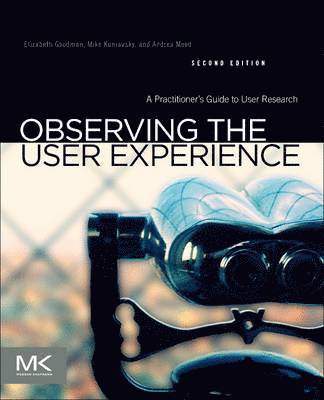
- Format
- Häftad (Paperback / softback)
- Språk
- Engelska
- Antal sidor
- 608
- Utgivningsdatum
- 2012-09-24
- Upplaga
- 2
- Förlag
- Elsevier Science & Technology
- Medarbetare
- Kuniavsky, Mike
- Dimensioner
- 235 x 189 x 25 mm
- Vikt
- Antal komponenter
- 1
- ISBN
- 9780123848697
- 1312 g
Observing the User Experience
A Practitioner's Guide to User Research
- Skickas från oss inom 7-10 vardagar.
- Fri frakt över 249 kr för privatkunder i Sverige.
Passar bra ihop
De som köpt den här boken har ofta också köpt Careless People av Sarah Wynn-Williams (häftad).
Köp båda 2 för 841 krKundrecensioner
Fler böcker av författarna
-
Cat Power
Elizabeth Goodman
-
Designing Connected Products
Claire Rowland, Elizabeth Goodman
-
Smart Things
Mike Kuniavsky
-
Pray Pray Pray
Elizabeth Goodman, Elizabeth Goodman
Recensioner i media
"In this second edition, the authors update an important contribution to the emerging discipline of user experience (UX) research…This book is one of many noteworthy titles from Morgan Kaufmann in this subject area. It is chock full of practical examples and advice for both novice and experienced practitioners." --ComputingReviews.com, January 2013
"Anyone even remotely interested in involving participants and observing their reaction and interaction with the product in order to enhance the overall user acceptance should deeply benefit from this book. I very much liked the practical examples, tables, and diagrams which have given this book a more vibrant feel and allowed the reader to feel like he can use this textbook directly in the practice of establishing some user experience tests. I think the textbook is profoundly informational and was a joy to read." --Software Engineering News, March 2012
"You'll like Mike Kuniavsky's broad selection of practical user research methods--presented clearly and usably. And you'll like his timing too: while recent books focus on the whys of user experience, many are now ready for the hows. Observing the User Experience does just that: It demonstrates how to discover what is in users' heads, and suggests how we might balance those considerations with business objectives." --Lou Rosenfeld, co-author of Information Architecture for the World Wide Web
"Wow! So many of the user experience research methods we have refined and used over the years are now organized and described in detail in one book. It is an essential reference for any practitioner." --Christian Rohrer, Manager, User Experience Research, Yahoo!
"Observing the User Experience provides the reader with a wealth of information. We now have a guideline that can be used to gain insight into those mysterious figures...our users. Knowing who our users are, what they need, and how they might use the things we build for them is the most important part of any product development cycle. Mike Kuniavsky's focus in this book is on the user experience as it relates to online interfaces, but ANYONE who builds ANYTHING can gain valuable knowledge from reading this book." --David Hoffer, Senior User Interface Designer, CTB/McGraw-Hill
"I love Observing the User Experience! This comprehensive guide approaches user experience research like never before, and is well-written, easy-to-read, and quite user friendly. It provides a real-world example of how research is done in just enough detail that it can both inform a CEO of the role of usability research as well as introduce methodology to someone starting out in the field. Bravo!"--Kelly Braun, Usability Manager, Ebay
"Mike Kuniavsky offers many practical procedures to conduct and analyze the results of your own custom usability tests. He shares lots of personal stories from the trenches, many of which are painfully ironic. The hope ...
Övrig information
Elizabeth Goodman has taught user experience research and tangible interaction design at the University of California, Berkeley and site-specific art practice at the San Francisco Art Institute. She has also worked with exploratory research and design teams at Intel, Fuji-Xerox, and Yahoo and speaks widely on the design of mobile and pervasive computing systems at conferences, schools, and businesses. She received her PhD from the School of Information at the University of California, Berkeley in fall 2013. During graduate school, her scholarly research on interaction design practice was supported by a National Science Foundation Graduate Fellowship and an Intel PhD Fellowship Mike Kuniavsky is a user experience designer, researcher and author. A twenty-year veteran of digital product development, Mike is a consultant and the co-founder of several user experience centered companies: ThingM manufactures products for ubiquitous computing and the Internet of Things; Adaptive Path is a well-known design consultancy. He is also the founder and organizer of Sketching in Hardware, an annual summit on the future of tools for digital product user experience design for leading technology developers, designers and educators. Mike frequently writes and speaks on digital product and service design, and works with product development groups in both large companies and startups. His most recent book is Smart Things: Ubiquitous Computing User Experience Design.
Innehållsförteckning
Part I: Why Research is Good and How It Fits Into Product Development
1. Typhoon: A Fable
2. Do a Usability Test Now!
3. Balancing Needs Through Iterative Development
4. The User Experience
Part II: User Experience Research Techniques
5. The Research Plan
6. Universal tools: Recruiting and Interviewing
7. User Profiles
8. Contextual Inquiry, Task Analysis, Card Sorting
9. Focus Groups
10. Usability Tests
11. Surveys
12. Ongoing Relationship
13. Log Files and Customer Support
14. Competitive Research
15. Others' Hard Work: Published Information and Consultants
16. Emerging Techniques
Part III: Communicating Results
17. Reports and Presentations
18. Creating a User-Centered Corporate Culture
Appendices
A. The Budget Research Lab
B. Common Survey Questions
C. Observer Instructions
Du kanske gillar
-
Nexus
Yuval Noah Harari
Häftad -
Careless People
Sarah Wynn-Williams
Inbunden -
Doppelganger
Naomi Klein
Häftad


